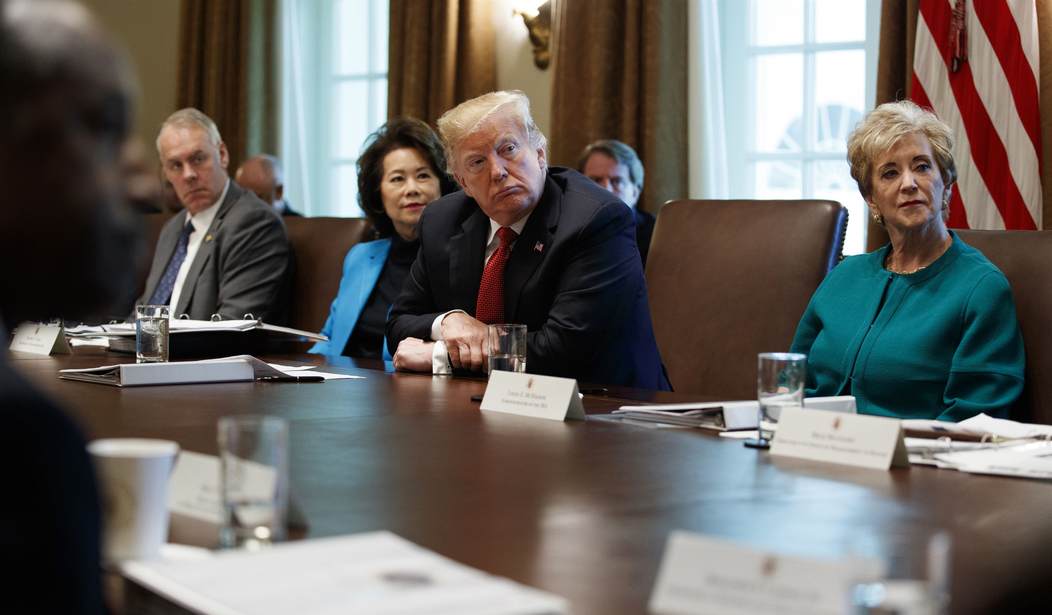I question the timing. Not in the usual sense, as some sort of way to change the subject, although perhaps that might be helpful in terms of the ongoing fumbles around the Epstein files. The timing in this case is the calendar -- and how little there is of it, in part because of the Epstein mess.
This week, the Daily Signal's Elizabeth Troutman Mitchell reported that the White House will "soon" send another rescissions package to Congress to trim even more previously appropriated funds from the federal budget. This time, Donald Trump will target the Department of Education, where he and Linda McMahon plan to reduce the workforce by 40%. The package will likely have other targets, but the main focus will be on savings as McMahon seriously downsizes her department:
The White House plans to introduce another rescissions package soon that will include cuts to education funding, sources familiar with the matter tell The Daily Signal. ...
White House deputy chief of staff James Blair told reporters on Friday the next rescissions package can be expected “soon.”
“We’ve got a number of items we’re looking at also, obviously talking to the senators too,” Blair said. “They’re going through the appropriations process. We don’t know what’s important to them, but you know, you’ll obviously see that very soon.”
The rarely used rescissions process is a way to reduce federal spending.
It's very rare, but not because it's particularly arcane. To make a rescission package work, you need a president inclined to tinker with the current budget rather than the next budget cycle, and a Congress that also wants to cut spending that either it or the previous Congress approved. The rescission process is relatively straightforward and even bypasses the Senate filibuster, which means it only needs simple majorities in both chambers.
It's the conditions that make it rare, not the mechanism. That's why 26 years elapsed between the 1999 rescission package and the one that passed last week.
And just to be pedantic, it's also the only way that federal spending has been reduced in that period. Other efforts at "reduction" until this year have mainly amounted to slowing down the rate of increase in federal spending. Even last week's rescission only reduced spending by $9 billion, or 0.139% of the current annual federal spending. And it took several weeks, a lot of pork-trading, and tons of pressure just to get that bill across both finish lines -- barely.
However, they did get it across those finish lines. So why not try it again? The answer to that is: September 30, and the legislative calendar. The current fiscal budget runs out on that date, and Congress has to pass a new budget before then or resort to the continuing resolution/omnibus option that Trump and Republicans profess to hate. Thanks to the late issuance of the first rescission package, the budget negotiations for FY2026 got pushed off or back-burnered in favor of the debate over the $9 billion in cuts to the current spending plan.
And here's where the Epstein mess comes into play. Speaker Mike Johnson and Senate Majority Leader John Thune could have cancelled the usual August recess to put more days on the legislative calendar to make up for that lost time, at least to a degree. However, Johnson will dismiss the House early to avoid what looks like a sure-pass bill demanding that the Trump administration release all documents on hand relating to the Jeffrey Epstein/Ghislaine Maxwell sex-trafficking operation.
That will push the FY2026 budget negotiations into September, likely not nearly enough time to get a budget in place by the deadline, even without any new debate encroaching on legislative time. If the White House wants another fight over rescissions to this year's budget, that will eat up even more of that limited time.
It makes far more sense to demand these cuts in the next budget cycle anyway, to ensure that Congress doesn't fund these operations in the future rather than at the moment. If, for some reason, the current budget doesn't include these cuts and others demanded by the White House, Trump can either veto the budget or push new rescission requests that deal with the issue after October 1.
That would work better in practical terms than pushing it now. For one thing, this budget cycle is almost up anyway. But by waiting for the next budget to pass, Trump can use rescission requests as a kind of line-item veto that passes muster under federal statutes and the Constitution, unlike other attempts to create that mechanism. As long as Trump has a GOP majority in both chambers willing to cut spending, that is -- and that's an issue for this new rescission package too, for that matter.
The White House will likely send over the request anyway, just to establish its position on the next budget and because the optics are generally good on spending reductions. Johnson and Thune will have to decide how to handle it, but don't be surprised if they spend their limited calendar on settling the FY2026 budget first.







